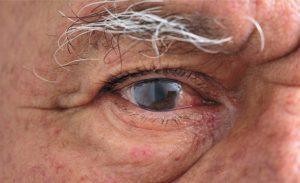 Glaucoma is a group of eye conditions that damage the optic nerve. Typically, damage to the optic nerve is associated with excess pressure within the eye, though it can occur in people with normal eye pressure. Though glaucoma can affect children and young adults, it is most common in people ages 40 and older, and is a leading cause of blindness in folks 60 and older.
Glaucoma is a group of eye conditions that damage the optic nerve. Typically, damage to the optic nerve is associated with excess pressure within the eye, though it can occur in people with normal eye pressure. Though glaucoma can affect children and young adults, it is most common in people ages 40 and older, and is a leading cause of blindness in folks 60 and older.
WHY IS MY GLAUCOMA GETTING WORSE?
The answer has to do with your individual case, but let’s look at the most common causes of worsening glaucoma:
. Getting older. Once we pass age 55, we are more vulnerable to vision issues like glaucoma, and more susceptible to disease progression.
. Increased intraocular pressure. Age, time and family history can cause blockages in the channels of the eyes responsible for the healthy flow of fluid called aqueous humor. Once this fluid is unable to exit the eye normally, pressure builds, aggravating glaucoma.
. Medical conditions. People with high blood pressure, diabetes, sickle cell disease and other issues may be more vulnerable to advancing glaucoma.
. Corticosteroids. Long-term use of corticosteroids, especially eye drops, can worsen glaucoma.
. Being Black, Asian or Hispanic. For reasons not quite understood, Black, Asian and Hispanic people tend to develop glaucoma earlier, and may encounter more rapid disease progression.
. Lifestyle. A lack of exercise can raise eye pressure and limit healthy blood flow to the nerves of the eye.
. Skipping doses. Forgetting to use prescription eye drops or pills exactly as directed by your doctor can allow glaucoma to become more severe.
HOW CAN I MANAGE GLAUCOMA?
Obviously, you can’t control getting older or your family history, but you can take positive steps to limit or halt the progression of glaucoma, and help protect your vision.
1. See Your Eye Doctor Regularly. While this is important for everyone, it is especially important if you have glaucoma or elevated risk factors for glaucoma. Comprehensive eye exams can help your eye doctor monitor disease progression and employ treatment to help prevent or delay vision damage. Your eye doctor will advise you on your exam frequency, but general recommendations are:
. Ages 40-49: every three years
. Ages 50-59: every two years
. Ages 60+: at least once a year
2. Take Your Glaucoma Medications on Schedule. Eye drops and/or oral medications need to be taken as prescribed. If you’re prone to forgetting, set a daily reminder on your calendar, phone or computer, or place post-its somewhere you will see them.
3. Get Regular Exercise. Regular aerobic exercise, including walking, cycling and dancing, encourages healthy blood flow and may help reduce eye pressure.
4. But Maybe Avoid Certain Exercises. While they may not be proven to make glaucoma worse, exercises such as powerlifting, inverted sit-ups, and yoga positions like downward-facing dog may raise eye pressure. If you’re in doubt about your exercise routine, talk to your eye doctor.
5. Monitor Caffeine Intake. Excess caffeine can raise eye pressure, especially in sensitive people. Try not to go overboard with coffee, tea, sodas and energy drinks.
6. Quit Smoking. Smoking can affect circulation, raise eye pressure and increase eye inflammation.
7. Avoid Rubbing. Glaucoma and related conditions like dry eye can make eyes feel itchy and irritated. Rubbing your eyes can aggravate glaucoma, so take steps to enhance eye comfort and moisture. Talk to your eye doctor about safe options for relief.
8. Ask Your Doc About Contact Lenses. While many people with glaucoma can continue to wear contacts, some conditions, medications and surgical procedures may make them less safe for you.
TREATMENT FOR GLAUCOMA
Getting timely treatment for glaucoma can go a long way toward limiting and even preventing permanent vision damage. Treatment options include:
Prescription Eye Drops – Usually the first line of treatment, eye drops work by lowering eye pressure either by improving fluid drainage (prostaglandins, miotic or cholinergic agents) or reducing the amount of fluid produced by your eyes (beta blockers, carbonic anhydrase inhibitors, rho kinase inhibitors). Some help limit excess fluid and promote fluid outflow (alpha-adrenergic agonists). They may be
prescribed singly or in combination.
Oral Medications – When eye drops are insufficient to lower eye pressure, you may need an oral medication like a carbonic anhydrase inhibitor to encourage healthy levels.
Glaucoma Surgery – When glaucoma fails to respond adequately to other treatments, or is posing a significant risk to vision, advanced, state-of-the-art surgeries can safely improve drainage and lower eye pressure.
. Minimally invasive glaucoma surgery (MIGS). For mild to moderate glaucoma, there is the option for stent placement to keep drainage channels open and working more smoothly.
. Selective laser trabeculoplasty. This outpatient surgery uses laser energy to clear blockages within the eye’s meshwork so fluid can drain more normally.
. Trabeculectomy. More advanced cases of glaucoma may require the surgical creation of a new drainage opening in the sclera (white of the eye).
HOPE FOR A GLAUCOMA CURE
Recent research conducted by Massachusetts Eye and Ear and MIT may reveal a promising outlook for glaucoma patients. Their findings suggest that glaucoma-related vision loss may be caused by an immune system malfunction, leading to the damage of retinal neurons. While this research requires much deeper investigation, it creates potential pathways toward prevention, targeted treatment and, perhaps one day, a cure for glaucoma.
LAKE EYE FOR GLAUCOMA DIAGNOSIS, TREATMENT AND SURGERY
Lake Eye (a US Eye Company) offers the latest, most sophisticated technologies and procedures to help keep your vision bright, clear and healthy for life. If you have glaucoma and haven’t had a comprehensive eye exam in the past year or two, contact us today. We have a comfortable, spacious, state-of-the-art location near you.
352-775-1533
LakeEye.com
1 RxSight P160055: FDA Summary of Safety and
Effectiveness Data. 2017.
 Central Florida Health and Wellness Magazine Health and Wellness Articles of the Villages
Central Florida Health and Wellness Magazine Health and Wellness Articles of the Villages



